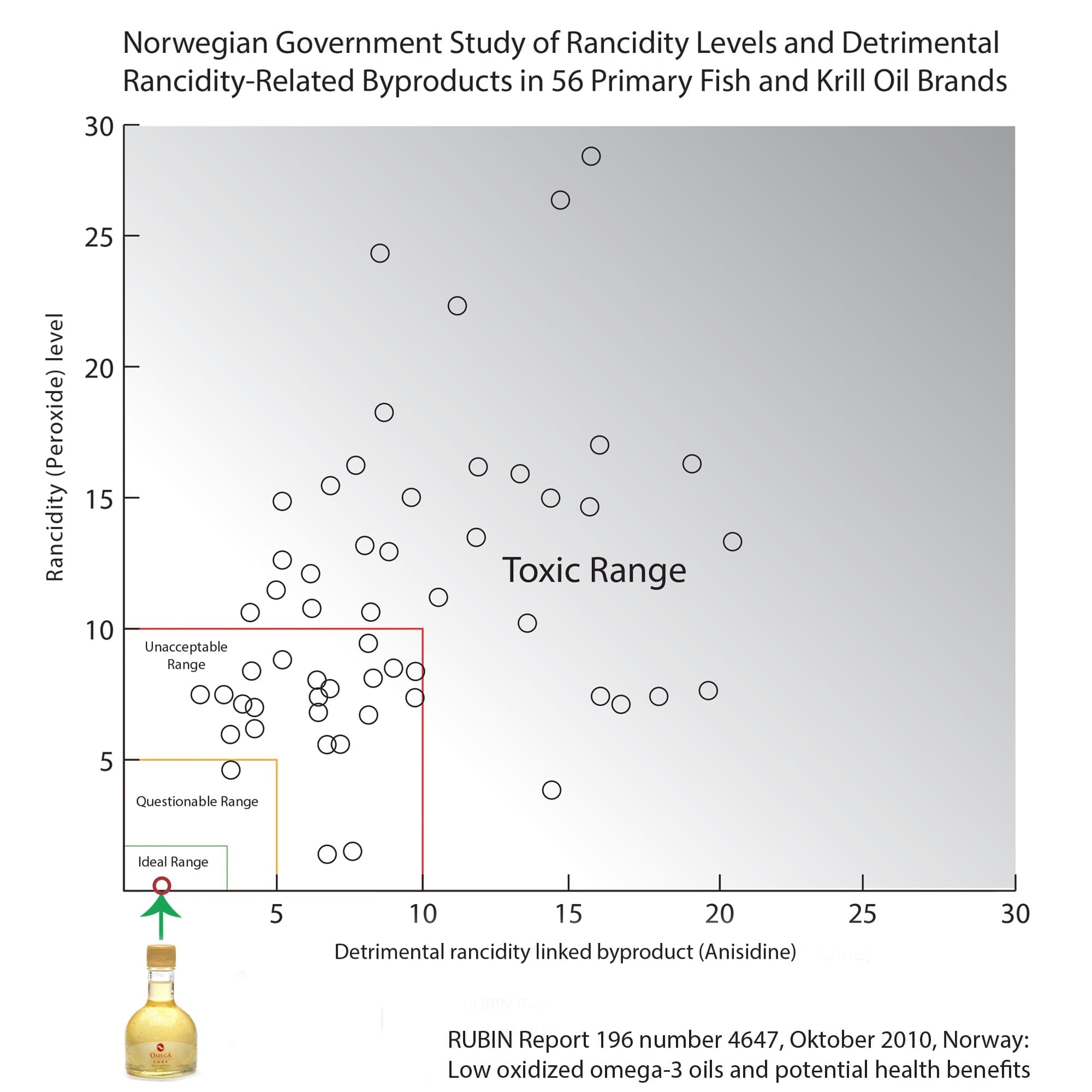What Bacon & Rancid Fish Oil Have In Common: Oxidized Fats
In 2015, the World Health Organization issued a warning that eating processed meats like hot dogs and bacon would increase the risk of some cancers and that red meat may similarly be harmful.
The story made national headlines despite the fact that the news was hardly a surprise to health-conscientious consumers. The same foods have already been linked to cardiovascular disorders (1), so pointing out the cancer risk didn’t create much astonishment.
But why might consuming processed meats be linked with an increased risk of developing cancer? And what might fish oil have to do with it?
More than 60 years ago, a young researcher in Illinois made discoveries about the link between altered fats in our diet and heart disease. This researcher, Fred Kummerow, relentlessly fought for the FDA to ban trans fats.
Kummerow stated that cholesterol by itself does not have a negative health impact. Rather, he suggested the damage would occur when the fats become oxidized, which happens with exposure to high heat (like frying) or when the fats go through sophisticated, industrial processing. When the fats oxidize, they can’t perform their physiologically-intended purpose. Instead, their manipulated chemical shape and characteristics create new metabolic actions that could promote aging and cell destruction.
It took the FDA nearly 60 years to take action and begin phasing out trans fats in foods (2). However, Kummerow’s broader research about altered, oxidized fats is still gaining traction.
One could say Kummerow has struggled to get his research recognized, both because of its scientific complexity and its call for change in the food industry and American diet. Rather than heed his warnings, the powers that be would much rather demand more research and bury his findings.
Maybe it would have been easier to demonstrate his conclusions if he had used fish oil as an example.
Omega-3, found abundantly in fish oil, is a group of molecules that is extremely prone to oxidation. When air reacts with the omega-3 molecules, a multitude of new molecules are formed. Some of the new molecules are smelly and discourage humans and animals from consuming the product. Some have no smell or taste, but can destroy cell membranes — or start to oxidize other fat molecules and create a free radical chain reaction that may eventually destroy DNA and denature proteins (3).

While researchers are starting to recognize that the quality of a fish oil is important for achieving health benefits (5, 6), the media is slow to react. To make matters worse, international studies have found that most omega-3 oils on the market are oxidized long before consumers even purchase them.
In many ways, the story of fish oil is similar to the story of bacon and processed meats. The more we process the fat or apply heat, the worse it becomes.
Yes, we have to purify fish oil to get rid of mercury and PCBs. But that purification process is completely different from extracting omega-3 using strong solvents, skimming or concentrating the oil into unnatural “pharmaceutical grade” versions, or changing the molecules into new synthetic forms with unknown long term consequences.
But fish oil doesn’t need to be so complicated. We already know how to produce fresh, wholesome and nutrient-rich cod liver oil. And just like fresh fish, it has no fishy taste or smell.
References:
1. Datz, Todd. Eating processed meats, but not unprocessed red meats, may raise risk of heart disease and diabetes. Harvard School of Public Health. May 17, 2010.
2. Dennis, Brady. The 100-year-old scientist who pushed the FDA to ban artificial trans fat. The Washington Post. June 16, 2015.
3. Albert BB, Cameron-Smith D, Hofman PL, Cutfield WS. Oxidation of marine omega-3 supplements and human health. BioMed Research International, vol. 2013, Article ID 464921, 8 pages, 2013. doi:10.1155/2013/464921.
4. Dobarganes, Carmen. Formation of New Compounds during Frying – General Observations. The AOCS Lipid Library. February 2, 2009
5. García-Hernández VM, Gallar M, Sánchez-Soriano J, Micol V, Roche E, García-García E. Effect of omega-3 dietary supplements with different oxidation levels in the lipidic profile of women: a randomized controlled trial. International Journal of Food Sciences and Nutrition. 2013 Dec; 64(8): 993-1000. Epub 2013 July 18.
6. Turner R, McLean CH, Silvers KM. Are the health benefits of fish oils limited by products of oxidation? Nutrition Research Reviews (2006), 19, 53–62.
Recent Posts
-
Omega-3, Weight Control
Anti-Inflammatory Diet: What To Eat & To Avoid
Inflammation is a double-edged sword. It’s the body’s natural defense system, springing into action to heal injuries and fight infections. But when it goes into overdrive and becomes chronic, it...2 weeks ago -
Dose, Omega-3, Omega3 Innovations News
How to Tell if Your Omega-3 Supplement Is Working
[vc_row][vc_column][vc_column_text]Whenever we pick up a new habit to improve our health -- be it working out with weights, cutting down on refined sugar, or taking three teaspoons of Omega Cure® every...1 month ago -
Omega-3
Can Omega-3 Fish Oil Help You Lose Weight?
Over the years, I've often heard people say, "I'm not sure about taking a fish oil supplement...won't omega-3 fatty acids make me fat?” Unfortunately, the notion that all fat is...1 month ago -
Omega-3
9 Foods That Are Very High in Omega-3s
Are you looking to boost your omega-3 levels? That’s a smart move, considering that a staggering 80% of people fail to get even half the recommended daily intake of these...1 month ago -
Brain Health
Does Melatonin Help With Anxiety?
Anxiety is on the rise, no doubt about it. In 2024, 43% of adults reported feeling more anxious than they did the year prior. That's up from 37% in 2023...2 months ago -
Omega-3
What Is DPA in Fish Oil? What You Should Know
In the omega-3 fatty acid world, there are plenty of types and acronyms that come to the family party. We've got EPA and DHA, the two omegas that usually take...3 months ago







